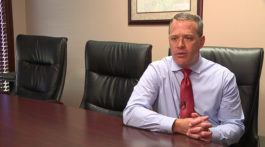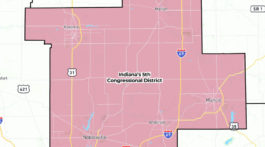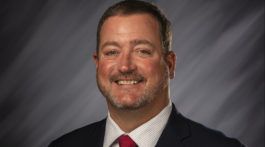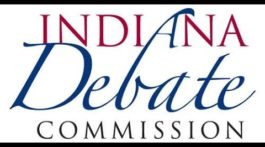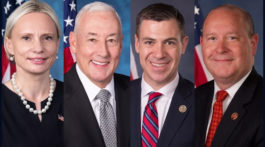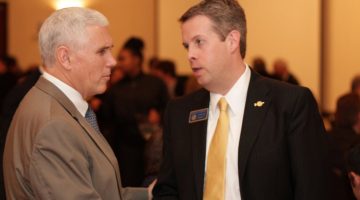by Leslie Bonilla Muñiz, Indiana Capital Chronicle
Dozens of candidates for Indiana’s top elected offices will hit Hoosier primary ballots this spring — including a whopping eight gubernatorial hopefuls, more than 150 state-level job-seekers and more than five-dozen congressional contenders.
Candidates aiming for the Democrat or Republican primary ballot had until Friday at noon to file their candidacy. The Libertarian Party holds nominating conventions in Indiana.
The so-called “major party” candidates on a list from the Secretary of State’s office (SOS) are still subject to challenge, however.
In successful challenges, the Indiana Election Commission can remove candidates who don’t meet certain requirements.
Underdogs now expected to make the ballot
To get on the ballot for Indiana’s crowded race for governor, candidates must collect signatures from at least 500 registered voters in each of the state’s nine congressional districts: 4,500 signatures at minimum. Campaigns aim for more, however, because signatures can be challenged and thrown out.
Eight have made the cut, including six Republicans: U.S. Sen. Mike Braun, businessman Brad Chambers, Lt. Gov. Suzanne Crouch, businessman Eric Doden and former Attorney General Curtis Hill and faith-focused mother of five Jamie Reitenour.
While campaigns for Braun, Chambers, Crouch and Doden have raised millions of dollars and easily secured their spots on the ballot, others worked with more limited means. Reitenour, for example, has raised just $17,000 but managed the task.
“Our campaign is turning heads for meeting the lofty Indiana ballot requirements on a tight budget,” Reitenour noted on Facebook Wednesday. “We never set out to spend our way into office, but to work our way into office.”
Republican-turned-Democrat Jennifer McCormick, formerly the state’s top education official, also submitted the thousands of signatures required to make the ballot.
She’ll take on Democrat Tamie Dixon-Tatum, who describes herself as a human relations and civil rights professional.
Most state lawmakers file for reelection
State-level legislators offered up no surprises in their filings, with more than 95% of 150 representatives and 96% of the 25 senators up for reelection throwing their hats back in the ring.
The six departing Republican representatives include Reps. Bob Cherry, Chuck Goodrich, Randy Lyness, Donna Schaibley, Jerry Torr and Denny Zent. While Goodrich is running for higher office — the competitive 5th Congressional District seat — his other colleagues have previously announced legislative retirements.
The lone Democrat leaving is Rep. Ryan Hatfield, who is running for Vanderburgh County Circuit Court judge.
While representatives serve two-year terms, senators get the gig for four at a time. That means half the chamber is up for reelection every two years.
Just one of those senators won’t be back on the ballot: Sen. John Crane, who previously said he did not want to be a “career politician.”
The filings don’t reflect those caucused in by party insiders after multiple lawmakers left mid-term.
But incumbents will face more than two-dozen same-party challengers during the primary, according to the SOS list.
With four incumbents leaving Congress, dozens vie to succeed them
Two Republicans are locked in fierce competition to replace Indiana’s junior U.S. Senator, Braun, who is forgoing reelection for a shot at the governor’s office.
Banks, Rust spar over residency as primary battle for Indiana’s U.S. Senate seat continues
U.S. Rep. Jim Banks and egg farmer John Rust have gone to verbal blows over Rust’s eligibility for the primary ballot.
But — for now — it seems as though Hoosier voters pulling Republican ballots will have two candidates to choose from. Senate hopefuls must meet the same 4,500 statewide signature requirement.
Democrat Valerie McCray, a clinical psychologist, also appears to have filed her stack of signatures, according to the SOS list. Fellow Democrat Marc Carmichael, a longtime politico, also qualified.
In Indiana’s First Congressional District, Democrat incumbent Frank Mrvan faces no primary challengers. The Democrat-leaning district is located in northwestern Indiana.
But three Republicans — Mark Levya, Randy Niemeyer and Ben Ruiz — will duke it out in May to face Mrvan in the November general election.
In the Second, incumbent Rudy Yakym runs unopposed by fellow Republicans. Yakym won the northern Indiana seat, which is heavily GOP, following the shock death of Rep. Jackie Walorski.
Democrat Lori Camp also runs unopposed in the primary.
In the Third, a full 11 candidates seek to replace Banks, who’s left his safe Republican seat in northeastern Indiana to pursue the U.S. Senate.
That includes eight Republicans: Grant Bucher, Wendy Davis, Mike Felker, Jon Kenworthy, Tim Smith, former U.S. Rep. Marlin Stutzman, Eric Whalen and state Sen. Andy Zay.
Democrats Kiley Adolph, Phil Goss and Thomas Schrader will face each other in May.
In the Fourth, longtime Republican incumbent Jim Baird will take on four GOP challengers: Charles Bookwalter, Trent Lester, Christopher Lucas and John Piper. The heavily red district is located in western Indiana.
Hoosiers pulling Democrat ballots will choose between Rimpi Girn and Derrick Holder.
In the Fifth, incumbent GOP Rep. Victoria Spartz said a year ago she’d leave her red central Indiana seat — only to reverse course days before the filing deadline.
The decision throws a wrench into the plans of other Republicans running in her absence, but several have said they’re staying in the race.
And 11 Hoosiers — Jonathan Brown, Raju Chinthala, Max Engling, state Rep. Chuck Goodrich, Mark Hurt, Scott King, Patrick Malayter, Matthew Peiffer, L.D. Powell, Larry Savage and Spartz— appear to have qualified for the ballot.
Two Democrats, Ryan Pfenninger and Deborah Pickett, will run against each other in the primary.
In the Sixth, retiring incumbent Rep. Greg Pence leaves a packed crowd of fellow Republicans to compete for his seat. It includes Jamison Carrier, Darin Childress, Bill Frazier, former state Rep. John Jacob, Sid Mahant, state Sen. Jeff Raatz, recent Indianapolis mayoral candidate Jefferson Shreve and state Rep. Mike Speedy.
Democrat Cinde Wirth is unopposed.
In the Seventh, incumbent Congressman André Carson will face Democrats Curtis Godfrey and Pierre Pullins. Republicans Philip Davis, Jenn Pace, Cat Ping and Gabe Whitley will compete to counter him in November.
The safe Democrat district is located entirely within Marion County.
In the Eighth, another retiring incumbent’s exit has created a crowded primary. The safe Republican district falls in southwestern Indiana.
Nine Republicans will compete to replace Rep. Larry Bucshon: Jim Case, Jeremy Heath, former U.S. Rep. John Hostettler, Dominick Kavanaugh, state Sen. Mark Messmer, Richard Moss, Kristi Risk and Jon Schrock.
Democrats Erik Hurt, Peter Priest III, Edward Upton Sein and Michael Talarzyk will appear on the opposite ballot.
And in the Ninth, incumbent Erin Houchin will attempt to fend off Republican Hugh Doty. On the Democrat ballot, D. Liam Dorris and Tim Peck will face off.
This red district is located in south-central and southeastern Indiana.


